On May 10, the "2022 China-Europe Seminar on Human Rights ", hosted by the China Society for Human Rights Studies and the Austria-China Friendship Association, organized by the National Human Rights Education and Training Base, Institute for Human Rights Law of Huazhong University of Science and Technology, and the Austria-China Law Association, was successfully held. This seminar has two main venues in China and in Austria, and the main venue in China is located in the Wutongyu Academic Exchange Centre of Huazhong University of Science and Technology. Representatives from the the UN’s Office of the High Commissioner for Human Rights and more than 100 human rights experts and scholars from the political, academic, legal, scientific and technological fields of China, Austria, France, the United Kingdom, Germany, Hungary, Italy, Greece, Spain, etc. discussed technology and human rights in an "online + offline" way.
Internet Rights
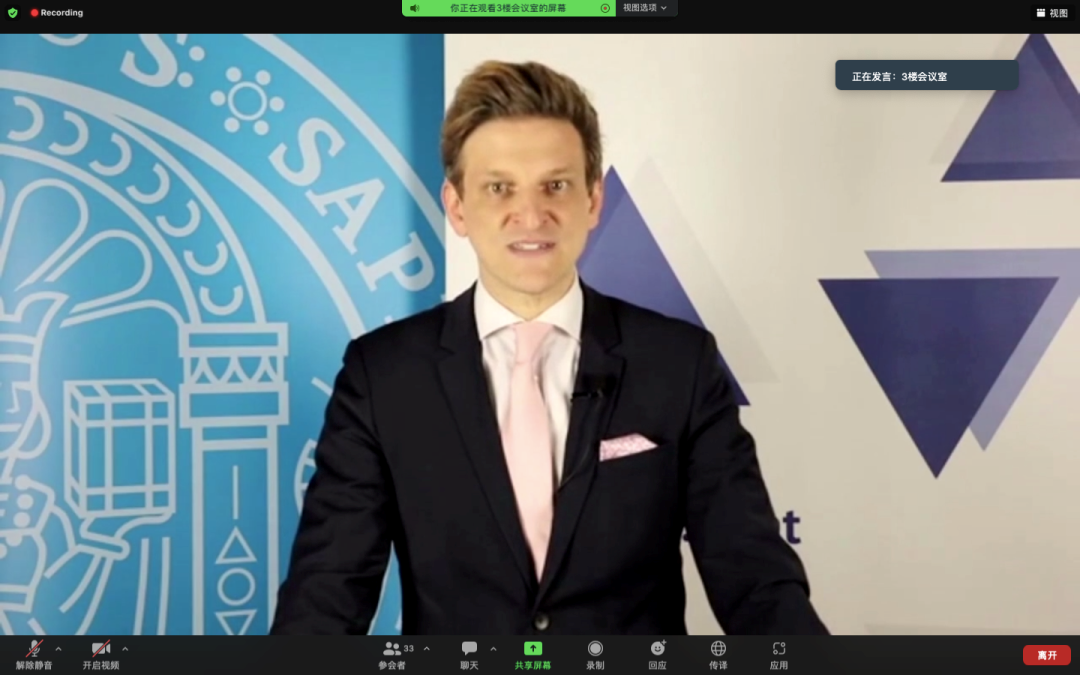
Mr. Michael Lysander Fremuth, Professor for Fundamental Rights and Human Rights at the University of Vienna, spoke on the topic of "Internet Rights". He proposed that the Internet, as a potentially global decentralized information and data network, is the driving force behind the globalization process. Therefore, Internet access can not only participate in technological progress as a "development right", it also has basic social functions. So it is significant to discuss the Internet access right. In this framework he explores three questions: whether there is a right to Internet access, under what conditions the country can restrict Internet access and whether the country has a positive obligation to provide Internet access. Finally, he emphasized that the country has the responsibility and obligation to provide the infrastructure for Internet access to promote free, open, interoperable and secure Internet access.
The Protection of Health under Covid-19 Pandemic
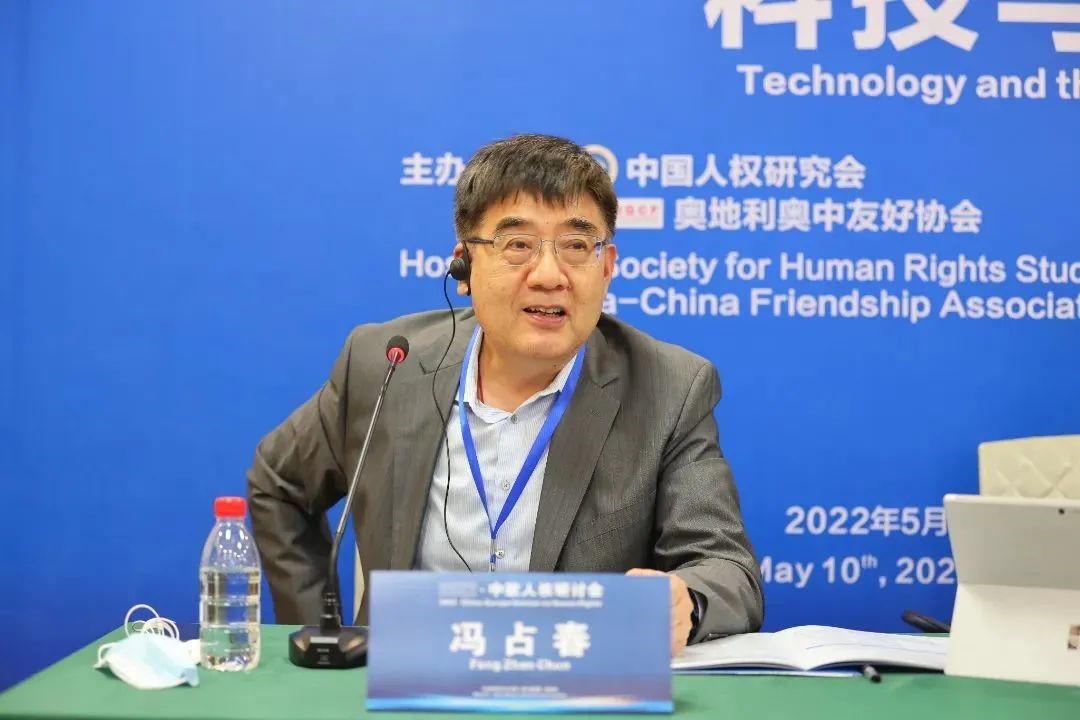
Mr. Feng Zhanchun, Dean of Tongji Medical College of Medicine and Health Management of Huazhong University of Science and Technology gave a speech on the topic of " The Protection of Health under Covid-19 Pandemic". He pointed out that health is one of the basic conditions for human existence, and the right to health is produced along with the emergence of human beings and has undergone a transformation from private rights to public rights. With the development of China's social economy, the Chinese government pays more and more attention to health and has started the "Healthy China" strategy. After the outbreak of the Covid-19 Pandemic, a very serious health crisis broke out. He pointed out that in the face of the pandemic, we must first pay attention to respecting the right to health and guarantee the medical services of the common people; secondly, we must realize the obligation of protection, and we must not blindly pursue economic development and put the people at risk; finally, the government should ensure adequate funding, resources, personnel input to achieve the rights and obligations.
View of Human Rights on the Attribution of Service Invention Achievements
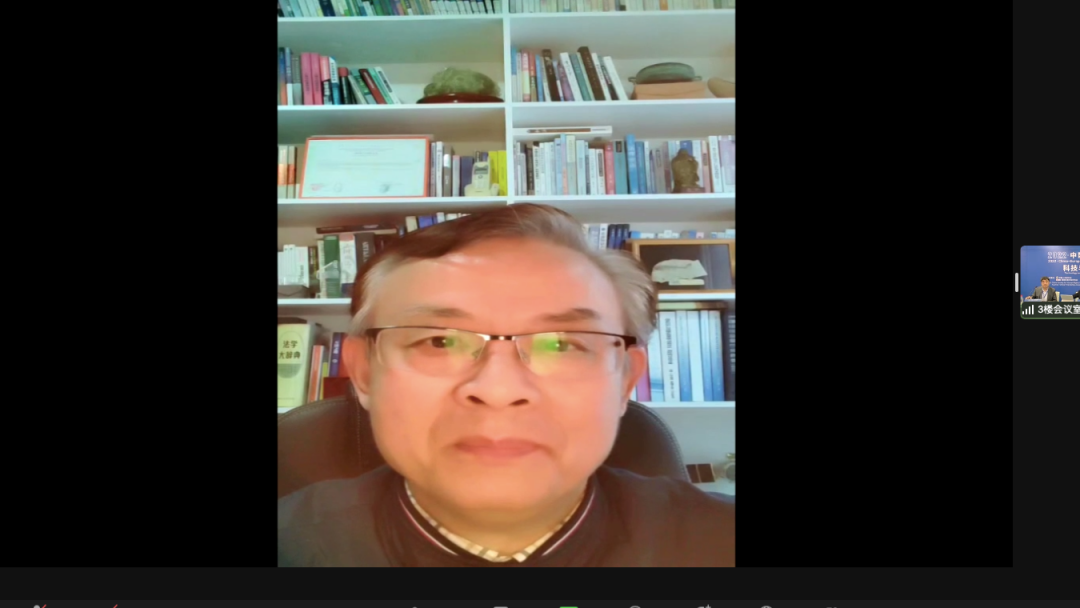
Mr. He Min, Professor for School of Intellectual Property of East China University of Political Science and Law, gave a speech on the topic of "Human Rights View on the Attribution of Service Invention Achievements". He discussed the attribution justice of the property rights of service inventions around the human nature of intellectual achievements and the attribution justice of service inventions. He proposes that intellectual outcomes are closely linked to specific personality identities. Although in the process of service invention, the intellectual conditions of the inventor and the material conditions of the unit are required, but according to the simple economic viewpoint of "input determines output", the unit and the inventor should share property rights. Since China has established a system of "post-employerism" or "post-unitism", the scope of service inventions is too wide, and it is difficult for inventors to enjoy corresponding property rights. He pointed out that the protection of property rights arising from intellectual investment of inventors is also an important part of human rights protection.
Technology Empowers the Development of Human Rights:Taking Assistive Devices as an Example
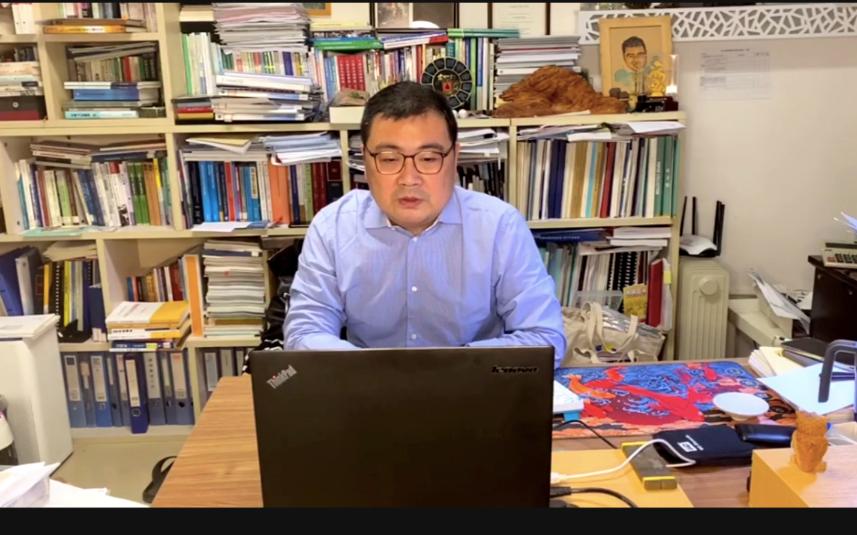
Mr. Zhang Wanhong, Dean of Human Rights Research Institute and Professor of Law School of Wuhan University, delivered a speech on " Technology Empowers the Development of Human Rights: Taking Assistive Devices as an Example". He mentioned that the produce and development of assistive devices are closely related to the needs of people with disabilities. In general, the assistive device industry for the disabled in my country is far from meeting the growing needs of the disabled. On the one hand, with the further deepening of population aging and the normalization of epidemic prevention and control, more and more people with disabilities have an increasing demand for assistive devices. On the other hand, the basic assistive devices in the past have transitioned to personalized and adaptive assistive devices, and some general-purpose assistive devices lacking technological content have been unable to attract the attention of the disabled. Therefore, China still needs to actively take measures to improve the adaptation rate of assistive devices.
The Human Rights Issues in Commercial Genetic Testing
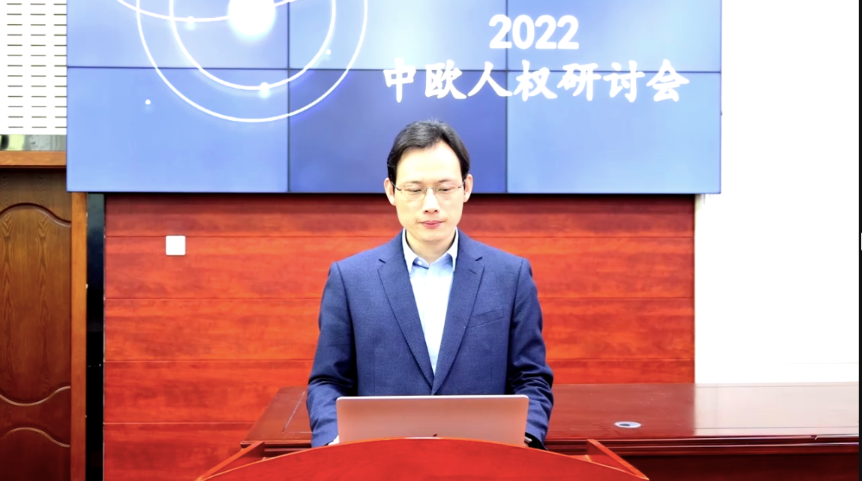
Professor Mao Junxiang, Executive Director of the Human Rights Research Center and Secretary of the Party Committee of the Law School of Central South University, delivered a speech on the topic of " The Human Rights Issues in Commercial Genetic Testing". He mentioned that human gene editing technology has shown its irreplaceable important value in more and more fields, but it has also brought a series of hidden concerns about human rights violations. He discussed how to ensure the stable development of science and technology from three aspects: "human rights protection risks caused by human gene editing", "the application of human gene editing technology endangers the right to life and health", and "the application of human gene editing technology initiates independent decision-making". At the same time, it takes into account the important proposition of human rights protection. Finally, he pointed out that a systematic legal risk prevention mechanism should be formulated, including the establishment of regulatory bodies, the promotion of separate legislation on human gene editing technology, and the determination of liability and relief mechanisms.
Be a Catalyst for Science Technology to Help Your Life

Mr. He Shaowei, Deputy Director of the Social Education Program of Central Radio and Television Station, gave a speech on the topic of " Be a Catalyst for Science Technology to Help Your Life ". He pointed out that technology and human survival and development can produce a benign chemical reaction, and the media should also play a catalytic role to help solve the present major problems. He vividly illustrated the role of technological development in safeguarding citizens' right to know, sense of gain and happiness through working examples of media professionals. He said that technology is not icy, it is closely related to human life and living. Media professionals have the responsibility to promote the inclusiveness and fairness of scientific and technological development, and should promptly remind people of possible human rights violations caused by scientific and technological development. In order to do a good job in popular science, CCTV Science and Education Channel has built a technology program dissemination platform. This platform better plays the inclusive and fair role of the media in promoting the development of science and technology.
The Impact of Artificial Intelligence for Women’s Right
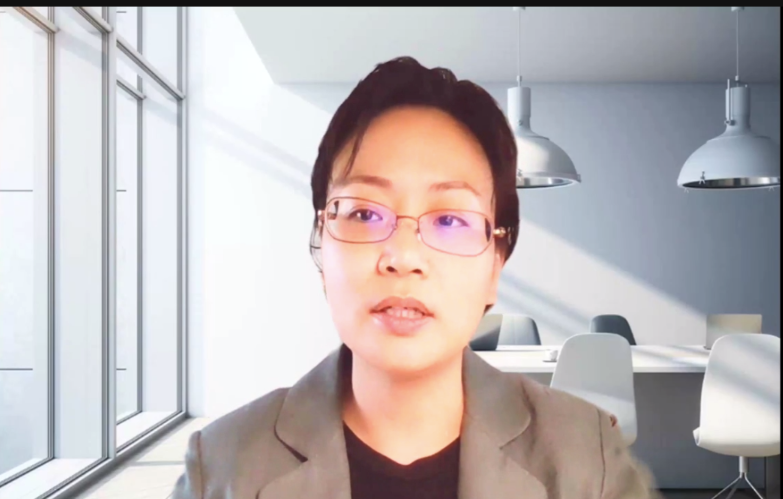
Associate Professor Lu Haina, Executive Director of the Human Rights Center of Renmin University of China, gave a systematic exposition on the theme of " The Impact of Artificial Intelligence for Women’s Right". She said that the degree to which an individual's mastery of digital technology will increasingly affect the right to work. In the post-pandemic era, it is necessary to narrow the gender digital divide from a legal and policy perspective to protect women's right to work better. She sorted out the specific manifestations of the digital divide affecting women's right to work, and analyzed the manifestations and underlying causes of the gender digital divide from the perspective of feminism and technology. She pointed out that the gender digital divide is the result of social construction, and the solution to the problem must start by breaking down this social construction. Finally, she started from eliminating the root cause of the gender digital divide, combined with relevant international legal documents, and advocated better protection of women's right to work.
How Science and Technology Can Promote Green Development

Mr. Ian Morrison, International Editor of China Daily, gave a speech on " How Science and Technology Can Promote Green Development". He pointed out that under the leadership of the Central Committee of the Communist Party of China with Xi Jinping at the core, China has made significant progress in improving and protecting the ecological environment in recent years. China actively fulfills its obligations to the international community to protect the environment, and seeks to strike a balance between climate change and economic development, people's livelihoods and national security. In order to promote environmental protection and achieve people's happiness, China has taken a series of measures such as leading the development of the global electric vehicle market to achieve climate goals, closing high-energy and high-polluting factories, and promoting the development of high-tech industries. He believes that only by ensuring the full implementation of the new development concept, maintaining strategic determination, and planning for social and economic development, can the lofty goal of harmonious coexistence between humanity and nature be achieved.
Reshaping the Value Stage of Human Rights: The Perspective of Science and Technology Risks and Responses in the Context of Risk Society
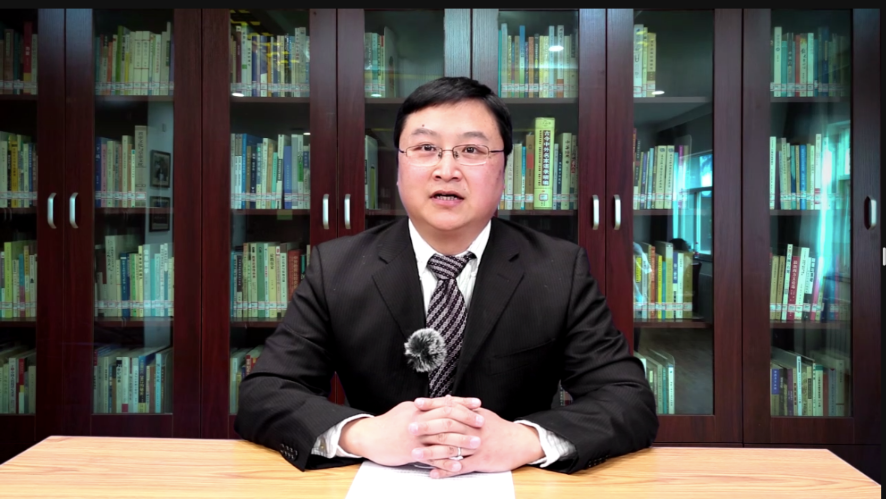
Professor Qian Jinyu, Executive Deputy Director of the Human Rights Center of Northwest University of Politicsand Law, delivered a speech on the topic of "Reshaping the Value Stage of Human Rights: The Perspective of Science and Technology Risks and Responses in the Context of Risk Society". He said that at present, the rapid development of science and technology has accelerated the formation of a global risk society, and the risk of modernization has posed a systematic challenge to the development of human rights. Therefore, it is necessary to re-recognize and explain the importance of the right to survival and development for all mankind, and reconstruct the human rights theoretical system and discourse system in the global human rights governance structure under the concept of a community with a shared future for mankind. He believes that the unpredictability and complexity of scientific and technological risks lead to the lag, multidimensional and arduous protection of human rights. Finally, he stressed that we should reshape the value hierarchy of human rights and deal with the risks of modernization with the concept of a community with a shared future for mankind.
Human rights and artificial intelligence in the new era
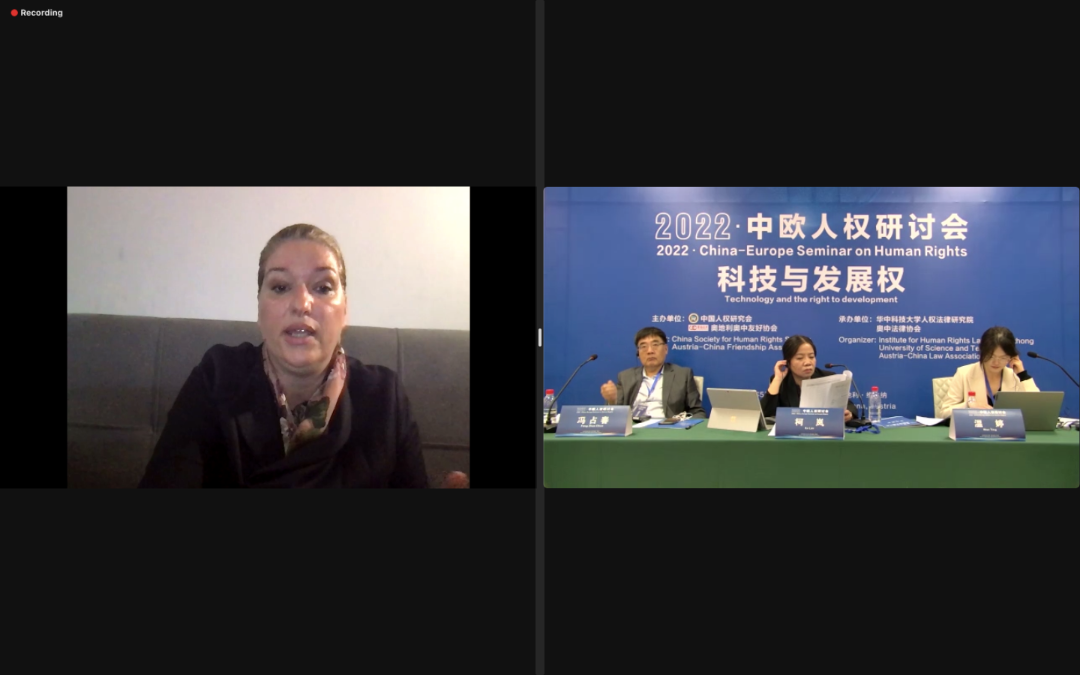
Ms.Haier, Senior Researcher, Academy of China Open Economy Studies (ACOES) of University of International Business and Economics, delivered a speech on the topic of "human rights and artificial intelligence in the new era". She said that AI will be the game changer of this era, which will help accelerate the economic development of major countries. Despite ongoing discussions on the importance of AI, there are still many related issues that have yet to be agreed upon. These issues are both political and related to a lack of in-depth understanding of what AI is about and its legal consequences. She believes that as artificial intelligence continues to enter our daily life, its tendency to interfere in human rights will become more serious. In recent decades, human rights have played an important political role and have been used by Western powers as a political tool to achieve employment and political goals. Therefore, the term human rights need to be redefined in order to truly reflect universal values.
Artificial Intelligence Promotes the Unification of Judicial Trial Standards
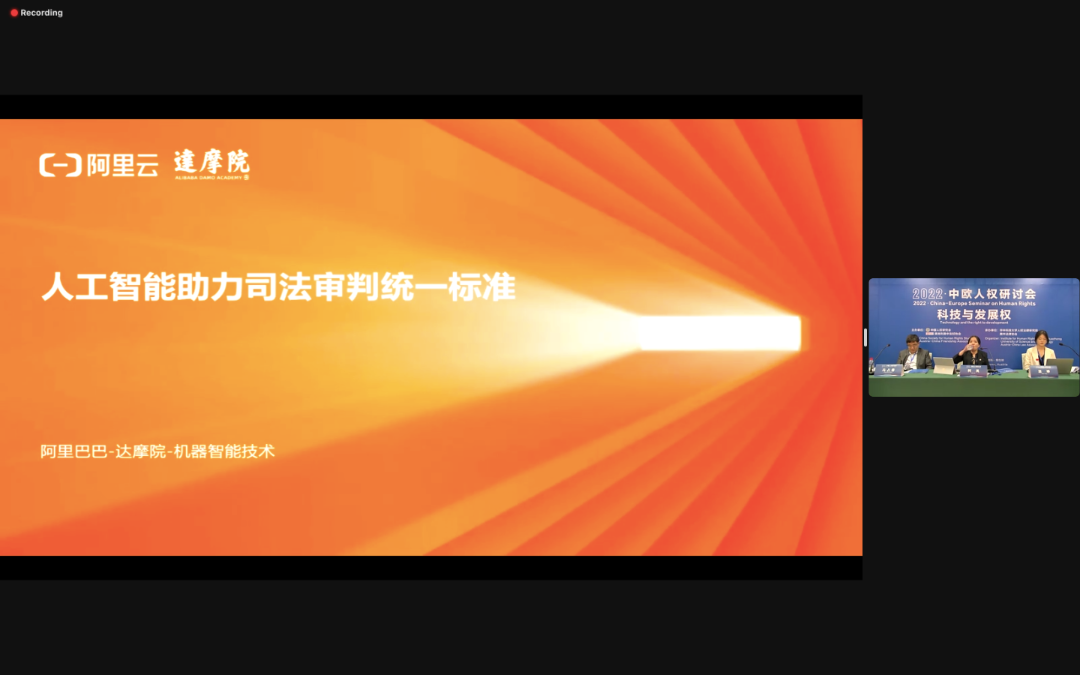
Mr.Sun Changlong, Technical Director of Alibaba DAMO Academy, spoke on the topic of "Artificial Intelligence Promotes the Unification of Judicial Trial Standards". He shared with us the whole process intelligent trial initiated by his company and the specific workflow of applying the intelligent ability to the financial intelligent trial. For example, in the aspect of consultation, the self-help question answering robot improves the guidance efficiency of users; in the filing process, the completeness and relevance of the information provided by users is automatically verified, which improves the filing efficiency; the use of important intelligent nodes in court trial and judgment can realize the automatic generation of evidence chain and other specific work. He said that by building knowledge maps and model algorithms, developing AI trial systems that simulate legal thinking and realizing the "man-machine integration" trial mode, AI will help judges handle cases and improve trial efficiency and accuracy.
UNESCO's Recommendation on Ethical Issues in Artificial Intelligence and Its Enlightenment on Ethical Governance of Science and Technology in China

Mr.Hu Xiaofan, Lecturer, from the School of Foreign Languages of China University of Political Science and Law, spoke on the topic of "UNESCO's Recommendation on Ethical Issues in Artificial Intelligence and Its Enlightenment on Ethical Governance of Science and Technology in China". She said that the UNESCO proposal on the ethics of artificial intelligence is the first global international instrument to regulate the scientific ethics of artificial intelligence. Firstly, the proposal reaffirms the basic values related to the protection of human rights; secondly, the proposal innovatively puts forward the values of protecting human rights of all mankind from the adverse effects of artificial intelligence; thirdly, the proposal also innovatively puts forward the values of preventing the human rights of some special groups from being adversely affected by artificial intelligence; finally, the proposal forms a dynamic and inclusive framework of artificial intelligence ethics in the form of soft law.
The Protection and Promotion of the Right to Education by Digital Technologies: China's Practice in the Context of the Pandemic

Ms.Bi Yingxi,Lecturer,fromHuman Rights Research Institute of Guangzhou Universityof Guangzhou University, made a speech on the topic of "The Protection and Promotion of the Right to Education by Digital Technologies: China's Practice in the Context of the Pandemic". She pointed out that the right to education is a fundamental right. How to better protect citizens' right to education is a practical issue that should be paid attention to in the post epidemic era. She mentioned that after the outbreak, in order to stop classes without stopping schools, online education and online classes have become important channels for primary and secondary education throughout the country during the epidemic. We should strive to narrow the digital divide in online education and ensure that all students have equal access to high-quality online education. With the high development of digital technology in China, educational equity has been better implemented, the gap between urban and rural education has been narrowed, and the development level of minority education has been improved. These are the core issues in line with the protection and realization of the right to education.
Changes in the Value of the Right to Education in Digital Age
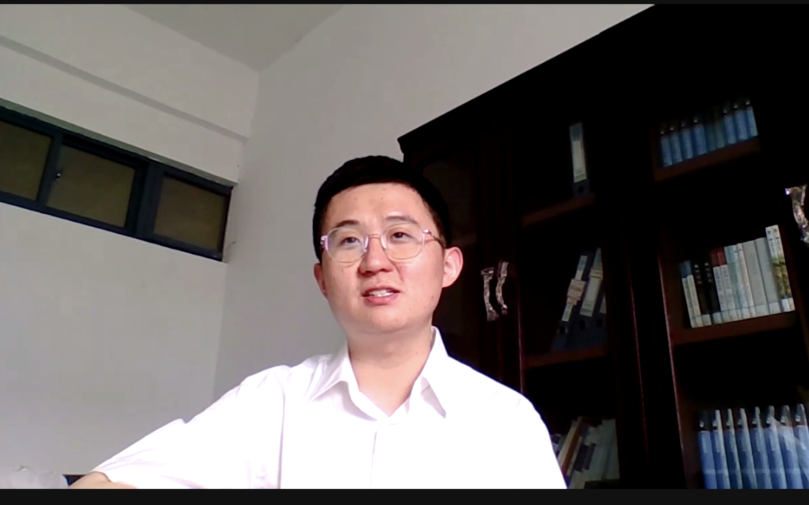
Mr.Zhang Yaoyuan, Ph.D Candidate of Institute for Human Rights of Southeast University, spoke on the topic of "Changes in the Value of the Right to Education in Digital Age ". He pointed out that fairness and quality are only the external ideal form reflected by the right to education, not its internal value basis. For the right to education, its valuation analysis should mainly start from the educating himself rather than the educator. Among them, freedom and equity are the core values of the right to education. With the advent of the digital age, the subject status of the educated has been gradually established, and began to share the educational discourse power with the educators. The value of the right to education began to change towards the value orientation of paying equal attention to fairness and freedom. Finally, he stressed that the value of educational equity is the bottom line of education that should be adhered to in the digital age, and the value of educational freedom is the call of the digital age for the development of high-quality education.
On the Protection of the Future Generations’ Right in the Gene Editing of Human Germ Cells
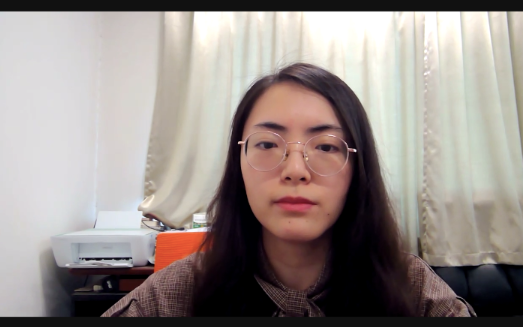
Ms.Zhang Xiaoxiao, Ph.D. Candidate of School of Law of Wuhan University, spoke on the topic of "On the Protection of the Future Generations’ Right in the Gene Editing of Human Germ Cells". She mentioned that because human germ cell gene editing technology has its own risks and will cause unknown genetic and social risks, the application of gene editing technology by contemporary people will have an adverse impact on the human dignity, the right to life and health, the right to biological information integrity and other specific rights of future generations. She explained how to protect the rights of future generations affected by gene editing from the perspective of institutional norms. At present, the regulation of germ cell gene editing technology in China is not perfect, and we pay less attention to the rights of future generations. We can learn from international legislation, strengthen the administrative supervision and ethical review of human germ cell gene editing, and establish a complete supervision mechanism to protect the rights of future generations.
Conflict and Coordination between Digital Intellectual Rights and the Right to Development
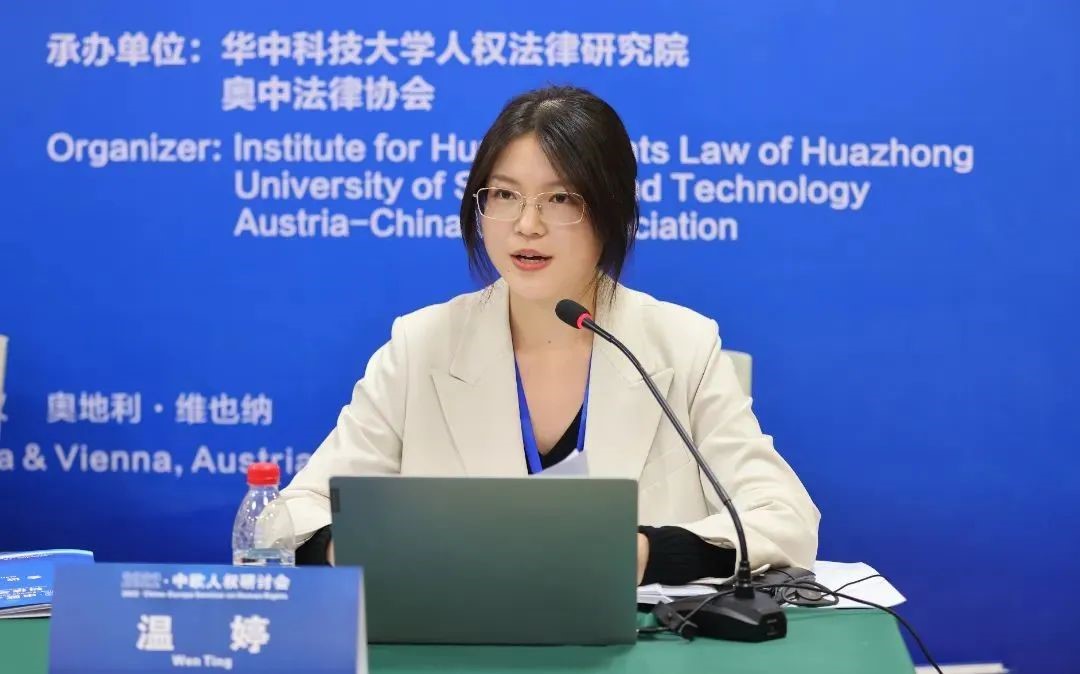
Ms.Wen Ting, Postgraduate Student of Institute for Human Rights Law of Huazhong University of Science and Technology, made a speech on the topic of "Conflict and Coordination between Digital Intellectual Rights and the Right to Development". She mentioned that the intangibility and instability of digital intellectual property rights were further strengthened compared with traditional intellectual property rights, which put forward higher requirements for intellectual property protection, which also caused the expansion of the intellectual property system in disguise and even more negative effects. The most prominent one is the conflict between digital intellectual property rights and the right to development, such as attribute conflict, means conflict and so on. Secondly, in order to prevent the expansion of public rights and the realization of private rights, we should reasonably deal with the conflict of public rights. At the same time, we should also pay attention to international cooperation and the construction of a community with a shared future for mankind, coordinate conflicts and enhance China's voice in international intellectual property protection.
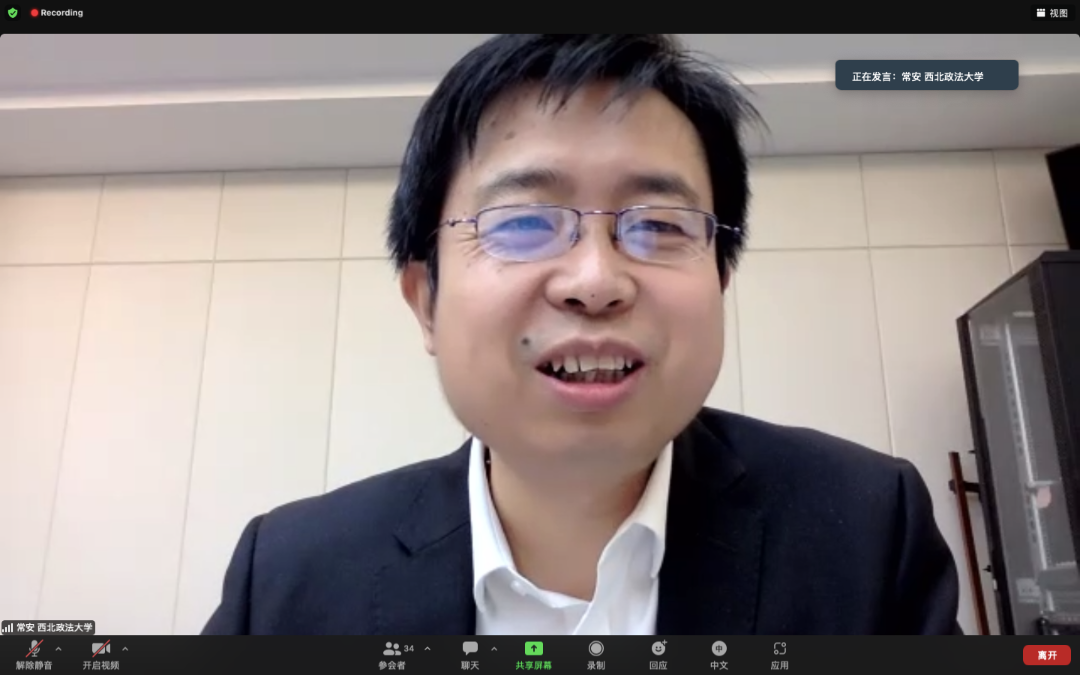
Chang An, Executive Director of the Human Rights Research Center of Northwest University of Political Science and Law, made a comment. He pointed out that the topics of the discussions focused on the Internet, science and technology and judicial rights protection, and scholars discussed from various perspectives, covering many topics such as the impact of technological enhancement in the field of assistive devices for persons with disabilities on the development of technology-enabled human rights, the media's guarantee of citizens' right to information, and technology for green development. Chang An made a supplementary argument from the aspect of protecting the rights of ethnic minorities. At the same time, he stressed that science and technology can help the development of human rights, and it inevitably bring some scientific and technological risks and scientific and technological problems, such as the impact of human gene editing and artificial intelligence on the right to work mentioned by scholars. In the face of many current problems, some scholars have given the path of building a community of a shared future for mankind to cope with the risks of modernization. Finally, he summarized from three aspects, and pointed out that people should promote human rights values in the face of science and technology, regulate through anti-monopoly and anti-unfair competition, and at the same time do a good top-level design to regulate technology instead of becoming its prisoner.
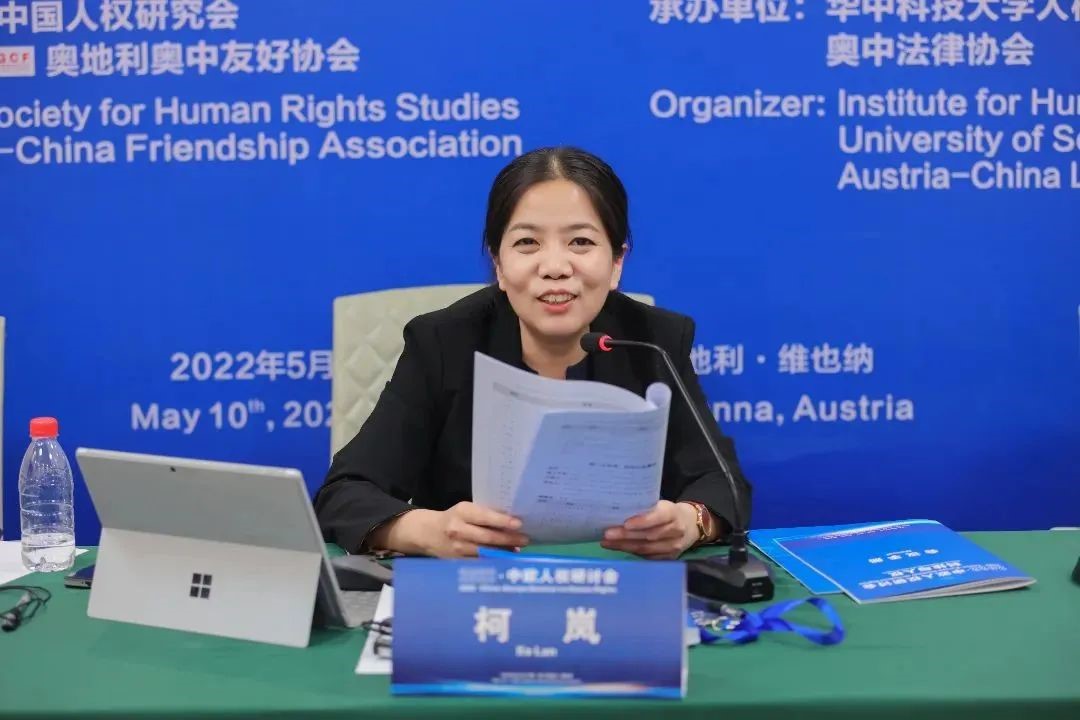
Ke Lan, researcher at the Institute for Human Rights Law of Huazhong University of Science and Technology and professor at the Law School, made a comment. She said that the speeches of the experts were wonderful, especially the scholars shared concrete examples of high-tech promotion of human rights, bringing new research perspectives. She talked about how people in all eras have referred to human rights with the presupposition of who can be considered a "person". In ancient Greece, for example, where Socrates lived, women, children, and slaves were not considered "human" in the full sense. In Kant's time, the concept of "man" was also limited, and here Professor Ke Lan quoted Kant's aphorism, "Man can only be an end and not a means", and Kant, as a racist in biological sense, did not regard Indians and blacks as "people" in the full sense. Professor Ke Lan questioned: the digital age has irresistibly entered our lives, if a person does not understand modern technology and cannot adapt to the current digital life, will this person be regarded as a "person" in an incomplete sense? She said that in the digital age, society can accept and tolerate every "digital refugee", providing them with sufficient means and resources to access convenient technology, which is the most important human right.
Zhang Wanhong, as a representative, shared the discussion of the second parallel session at the closing ceremony. He pointed out that the second parallel session mainly focused on two aspects: science and technology to challenge human rights and technology to empower human rights. The characteristics of this forum can be summarized as "three many”, “three people” and “three haves”. “Three many" are many disciplines, speaking scholars from different disciplines such as law, medicine, computer science and so on; many professional backgrounds, speaking experts include university teachers, editors, directors of science and technology companies, etc.; many kinds of culture, speaking scholars are from Austria, Greece, Germany and other countries. "Three people" are as below: from human rights perspective, some scholars have discussed the right to Internet access; from humanistic feelings, some scholars talk about the right to health, talk about the protection and promotion of digital technology to the right to education; from human rationality, some scholars have put forward suggestions on the ethical issues of artificial intelligence. The "three haves" are: Having focus, focusing on genetic testing, gene editing, epidemic prevention and control, scientific and technological risks, invention patents and other areas of science and technology and human rights; Having echoes, there are topics that intersect and interact, and different scholars discussed the risks caused by human gene editing from human rights and artificial intelligence cross-vision; Having temperature, such as media industry scholars to discuss how the media can be a good catalyst, how to improve the temperature of human rights, and some scholars talked about women's right to work under the digital divide.